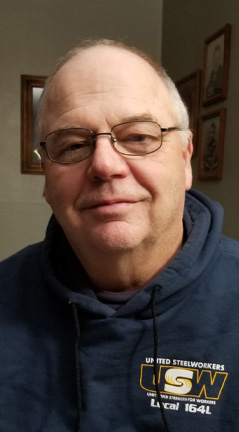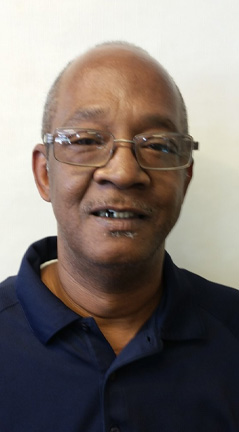
The Loud and Clear Call for Medicare Expansion
Growing up, Tom Hay helped to raise hogs and crops on the family farm, never thinking to protect his ears from the din of tractors, combines and other machinery.
And while his United Steelworkers (USW) contract provided safety controls and protective measures during his decades at Titan Tire, he wasn’t surprised when hearing tests revealed his ears aren’t as sharp as they used to be.
Right now, Congress is on the cusp of helping millions of Americans like Hay live better lives. In addition to enhancing access to prekindergarten and battling climate change, among many other overdue improvements, Build Back Better legislation would expand Medicare to cover hearing aids and other auditory care for the first time.
Hay knows that just like a strong heart and powerful lungs, robust hearing is essential for seniors’ health, safety and fulfillment.
They need to hear honking horns warning them that they’ve stepped into oncoming traffic. They need to hear the sirens of police cars and ambulances that zoom up behind them in traffic. And they need to hear the alarms alerting them to fires, intruders and other dangers at home.
Yet even though about half of Americans 60 and older struggle with hearing loss—and even though voters overwhelmingly support Medicare coverage for auditory services—the nation has long relegated hearing care to the back burner.
As a result, many seniors delay getting hearing aids or forgo them altogether because of the expense, which can run to thousands of dollars. Numerous retirees shared these sorts of stories with Hay while he served as president of USW Local 164, the union representing workers at Titan Tire in Des Moines, Iowa.
“They go get a hearing test and realize they can’t hear anything,” Hay recalled. “Then, when they find out what it’s going to cost, it’s like, ‘Oh, my gosh, I don’t know where the money is going to come from.’ They about fall over.”
Today’s hearing aids provide more help than ever before, and that’s all the more reason to get them to those in need.
They’re compact and highly sophisticated, delivering superior sound quality along with Bluetooth capability that connects users with their electronic devices. Vendors even offer remote support.
The demand for hearing tests and assistive devices is so great that some chapters of the Steelworkers Organization of Active Retirees (SOAR), including Chapter 31-9 in Southeast Chicago, negotiate special rates with local providers.
“It’s a quality of life issue,” said Bill Alexander, the chapter president. “You don’t even know when people are telling you they love you, if you can’t hear.”
While he’s pleased to be able to make these services more readily available to SOAR members, Alexander believes all seniors, wherever they live, need access to affordable, high-quality hearing care.
Because Medicare covers other essential health needs during retirement, Alexander explained, it only makes sense for the program to cover hearing care as well. He’s eager for Congress to heed Americans’ call and pass the Build Back Better legislation, currently under consideration in the House.
“If Medicare will give us a blood pressure monitor, why can’t it give us a hearing aid?” asked Alexander, who retired from Acme Steel and Iron and predicts that he’ll need hearing aids one day. “It’s just as important. I know high blood pressure is a silent killer. But I don’t know what life would be like not being able to hear.”
People with hearing loss are more likely to experience depression, loneliness and isolation. They’re at increased risk of dementia and falls.
And untreated hearing loss is also a potential barrier to care in medical facilities, especially in conjunction with COVID-19 mask protocols that make one-on-one communication in hospitals and similar settings more difficult. Caregivers can have difficulty assessing and treating patients who are hard of hearing, and impairments rob seniors of the right to actively participate in their care.
“There’s a lot of times they don’t hear you, and they don’t respond,” Chris Sova, a licensed practical nurse, said of some of the patients at Bay County Medical Care Center in Essexville, Mich. “There’s just that breakdown.”
Sova hopes that expanding Medicare to cover seniors’ auditory care will spark a broader, nationwide conversation about hearing health.
“It’s not just about the elderly,” explained Sova, president of USW Local 15301, which represents workers at the Bay County facility. “Hearing loss doesn’t magically happen in old age. It gradually occurs over years and years. It’s something that could be prevented.”
By “opening the door” through Medicare, he continued, “maybe we can get more preventive care as well.”
Hay, who retired two weeks ago, knows that Medicare expansion would have a real impact on his retirement.
As his hearing continues to decline, he wants to be able to follow the chatter at his grandchildren’s sporting events and enjoy their school concerts and other activities. He’s earned that after a lifetime of hard work.
“If I had to ask somebody what they said all the time, it would be kind of embarrassing,” he explained. “You get to the point where you’re not going to ask and just pretend you know what is going on.”
*
Photos of Tom Hay and Bill Alexander
By clicking Sign Up you're confirming that you agree with our Terms and Conditions.
Related Blogs
Ready to make a difference?
Are you and your coworkers ready to negotiate together for bigger paychecks, stronger benefits and better lives?

